Yesterday we had one of the first acqua alta‘s of the winter. It wasn’t exceptionally high, reaching a level of 100cm above the historical average water level, but it was just enough to wet a few places around the city, and more than enough to ground all but a few of the gondolas of the city.
The basis of the tide is the gravity of the sun and the moon, which gives the astronomical tide. In Venice the astronomical tide is from approximately from -40cm to +70cm at spring tide, and from 0cm to +50cm at neap tide. The astronomical tide is predictable and can be calculated for years in advance. A year’s worth of tables are available on the city’s web site.
On top of the astronomical tide comes the meteorological tide. Sustained strong E or SE winds in the Adriatic Sea push more water up into the Adriatic and then into the lagoon when the tide is rising, and impede the water flowing out with the falling tide, causing both lows and highs to stay above the level of the astronomical tide. The meteorological tide can be forecast for several days in advance.
The municipal tide forecast office publishes updated forecasts several times each day, for three day periods.
Yesterday’s high tide consisted of an astronomical high tide of +41cm, and a meteorological tide of +59cm. The wind in the lagoon was F4 NE in the morning, rising to F5 NE in the afternoon.
We went paddling, at bit with the hope that we could have a bit of fun on St. Mark’s square in a kayak 🙂
A couple of hours before the expected high the water was already at the edge of some campi, like here at the Campo dell’Arsenale. I often take people under the the bridge behind the lions, but there was no chance of doing that today, so we paddled back out to the Bacino S. Marco to enter the next canal.
At the Campo SS. Giovanni e Paolo, or Campo Zanipolo in Venetian, the water was also at the edge of the square, without spilling over.
We had timed our arrival at St. Mark’s to match the highest point of the tide, and as we arrived under the Ponte di Paglia (from where you can see the Bridge of Sighs), the water was washing over the pavement on the left.
The wind didn’t make itself much felt inside the city, but outside it had a free reign. In the city there were no gondolas about, because the level of the tide blocked their passage under most bridges. This was the only gondola we saw working all day. It does look like its can be a cold, wet and rather hard job being a gondoliere in Venice.
The tide was not enough to paddle across St. Mark’s. There were maybe 20cm of water on parts of the square, but the parts closest to the bacino are higher, just about the 100cm mark, so there was no water just behind the gondolas, unlike further in towards the basilica.
This building in Rio S. Zulian, just behind the basilica, was clearly build when the level of the city was higher and the tides lower.
The Campo di Guerra had a bit of water on it.
The Fondamente della Regina in the Rio Baratteri had the water up to the edge of the fondamenta.
This gondola in Rio delle Procuratie is not going anywhere with this tide,
and neither will these
There are some low lying areas around the Rialto too
including the Erbaria where the cafés often have tables outside, only today their guests would have gotten wet from above and from below.
The Ca’ d’Oro is on the best preserved Gothic buildings on the Canal Grande, dating from the 15th century. It is a nice portico towards the canal, albeit a bit humid today.
Not many have done this before
The inside of the Ca’ d’Oro is a museum, where they have boats too, and water on the floor.
Two hours after the highest level of tide the water was still high in the Cannaregio area, as here on the Rio della Misericordia. Normally in Venice you’d step down into a boat, but here you’d step up into it.
When we started heading back home it quickly became clear that the NE winds in the lagoon were well above their remaining strength, so I decided to tow the two boats back, and let the couple return to the camp site with the vaporetto. It was a bit complicated towing two boats down narrow canals in a headwind, but at least I was moving forwards. When I arrived in the Canale S.Pietro and the Rio Quintavalle, which leads out of Venice in a NE direction, the wind was so strong that I only managed to move forwards at a snail’s pace.
In front of me I had the Canale delle Navi, which is one of the busiest canals around Venice. It is the main passage from central Venice and the Lido to Murano and the airport.
The time was about an hour before sunset. Light was waning, the sky was overcast and it was raining a bit. The canal in front of me was full of two feet waves with white foamy crests.
I would have been foolish trying to cross it into a F5 headwind with two empty boats on a rope, moving at less than a knot, with vaporetti and taxis moving up and down the canal around me.
Consequently, I entered a little harbour on the island of Olivolo, where I hauled the two kayaks up and tied them safely to a railing, before I took my own kayak and started the paddle back to the Lido to meet the other two.
Without the two kayaks behind me I made good progress and crossed the Canale delle Navi quickly, only meeting a couple of vaporetti. They crew pointed at me and made some gestures that probably meant they didn’t think I were in any kind of sensible place and situation at that time. They might have been right, but I still made it to the other side.
Just as I came across the canal and passed the elephant sculpture in front of the Certosa island, lightning cut across the sky over the Lido. Thunder followed a while later, indicating the lightning was some two kilometres away. Somehow the weather forecast for the day had let that part out, or I would have cancelled the tour completely.
I paddled around the Certosa island as close to the shore as I possibly could for wind and waves, and found some shelter in a small canal behind the Sant’Andrea fortress. A few more lightnings greeted me along the way, now a bit closer.
I waited a bit, and spend the time finding some headlamps and glowsticks in my hatches, while I counted the time between lightning and thunder until I had the impression that the thunderstorm was moving down the Lido over the sea, away from me.
The crossing from Sant’Andrea to S.Nicolò is only about 250m, but its the main canal from the sea to Venice, used by everything from small motorboats to fifteen storey tall cruise ships. I paddled as fast as I could, it was now very dark, looking left and right to make sure any other traffic would spot my blinking headlamp and avoid me. There were nobody else stupid enough venture out, it seems, because I saw nothing.
I was more or less in the middle of the canal, when my phone rang (playing one of my favourite Leonard Cohen songs), lightning blasted across the sky and thunder roared simultaneously. The thunderstorm had turned around and it was now straight above me. I sped up (and didn’t answer the phone).
Once across, I hauled by kayak out of the water, carried it into the camp site and started taking my inflatable platform up.
My guests called back, came back after a while, and we got the last few things in order before I closed the gate and headed back home. The couple were as wet as me, and probably more tired. We all got a bit more adventure than we had bargained for.
I still have two kayaks tied to a railing on the Isola di S.Pietro, and will have to go and fetch them tomorrow.
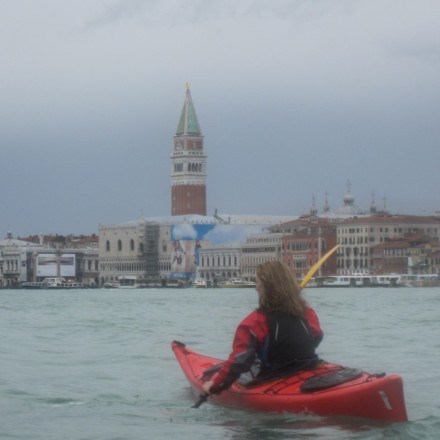
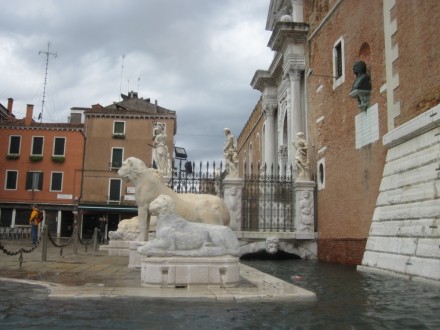
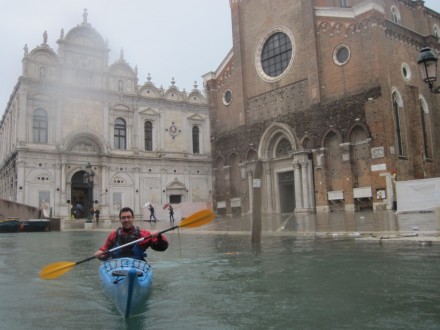
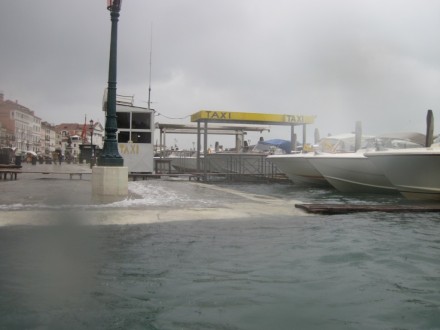
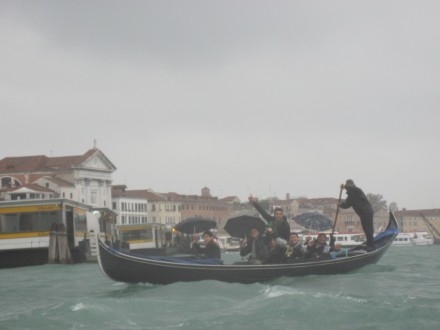
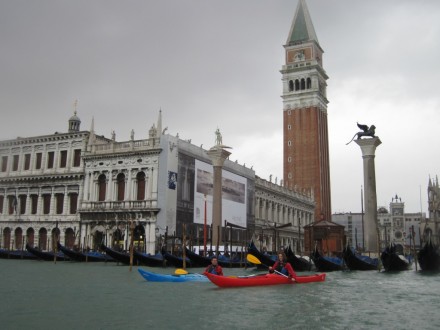
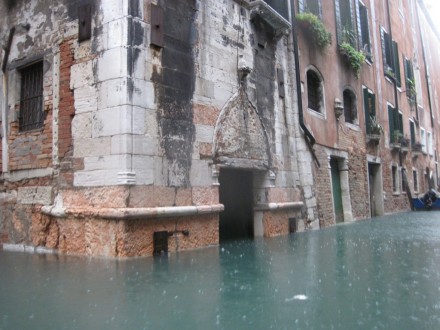
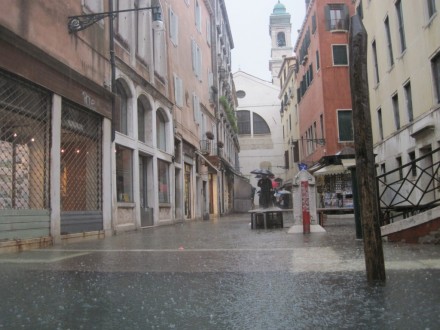
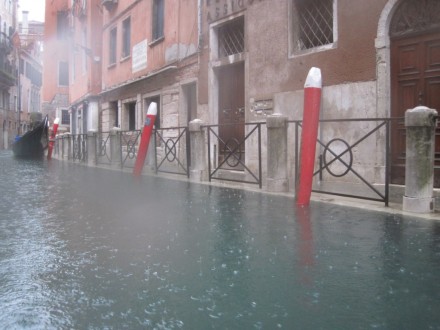
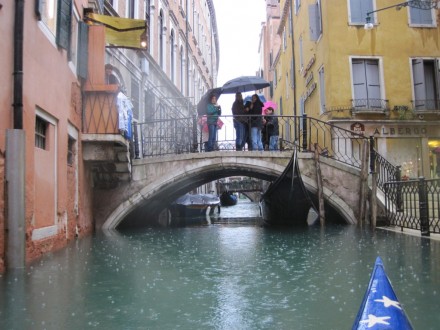
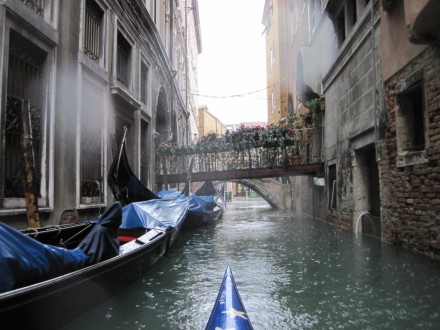
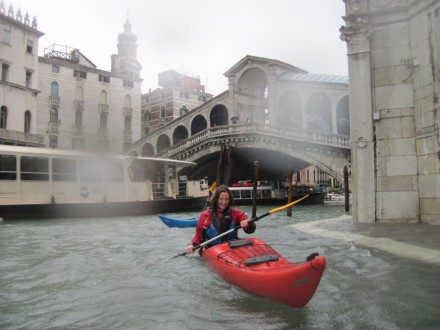
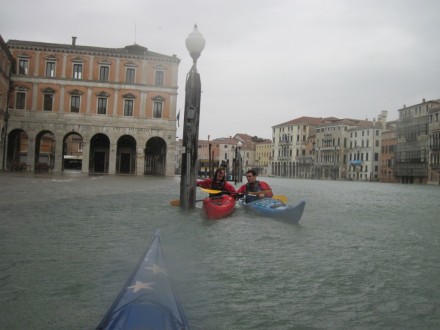
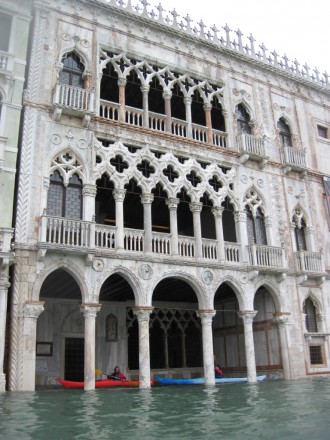
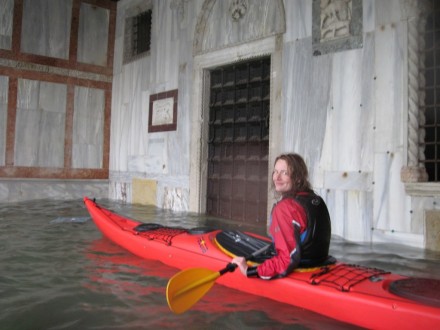
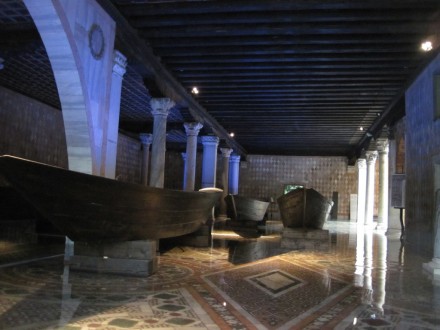
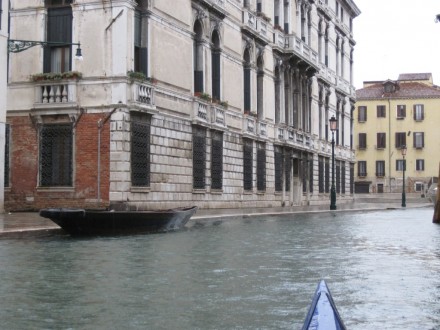
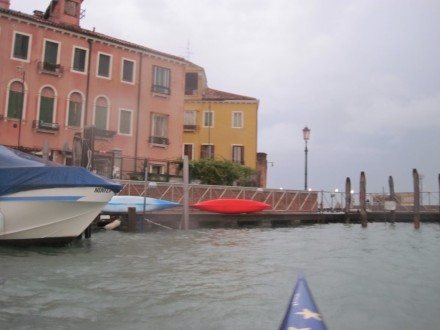
Leave a Reply